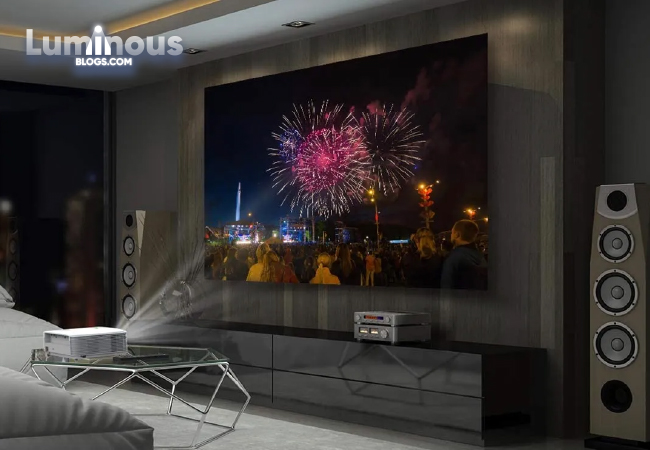
Choosing the Perfect Home Theater System
In an era where the line between going to the movies and staying home for an exceptional cinematic experience is blurring, the need for the perfect home theater system has never been greater. Whether you're a movie buff, a sports enthusiast, or an avid gamer, a home theater system can elevate your entertainment to new heights. In this guide, we'll walk you through the essential factors to consider when choosing the perfect home theater system for your space, needs, and budget.
Understanding the Basics: What Is a Home Theater System?
A home theater system is a combination of audio and visual components that replicate the experience of a commercial cinema within the comfort of your home. It typically consists of the following key elements:
Display Device: This is usually a large-screen TV or a projector and screen. The choice between the two largely depends on your room size and personal preferences.
Sound System: The audio components include speakers, an AV receiver, and often a subwoofer to deliver rich, immersive sound.
Source Devices: These are the devices that provide content, such as a Blu-ray player, streaming media player, gaming console, or cable/satellite box.
Cables and Connections: To connect all the components and ensure they work together seamlessly, you'll need high-quality cables and connectors.
Furniture and Room Acoustics: The right furniture and room setup can impact the overall experience. Comfortable seating and acoustically optimized room design play a crucial role.
Factors to Consider When Choosing a Home Theater System
Room Size and Layout
The size and layout of your room will greatly influence your choice of a home theater system. Consider factors like the room's dimensions, shape, and the placement of doors and windows. Smaller rooms may benefit from sound bars and compact systems, while larger spaces can accommodate a full 7.1 or 9.1 surround sound system.
Budget
Your budget is a significant factor in determining the components and quality of your home theater system. Consider how much you're willing to invest in both the initial setup and any potential future upgrades. Quality components are essential for an optimal experience, but you can find options at various price points.
Display Device
When choosing a display device, think about your preferred screen size, resolution (e.g., Full HD, 4K, or 8K), and the type of display (TV or projector). Projectors offer a more cinematic feel and can provide a larger screen, but they require a dark room and proper placement.
Sound System
The heart of your home theater is the sound system. You'll need to decide between a sound bar, a 2.1 channel setup, or a full surround sound system like 5.1, 7.1, or 9.1. Factors such as speaker placement, power, and compatibility with the AV receiver are crucial. High-quality speakers and a subwoofer can significantly enhance your audio experience.
Audio and Video Sources
Consider the types of content you'll be watching. Blu-ray players offer high-quality video and audio, while streaming media players provide access to online content. Make sure your sources are compatible with your display device and sound system.
Streaming Capabilities
Many modern home theater systems offer smart features with built-in streaming capabilities. Check whether the system supports your preferred streaming platforms, such as Netflix, Amazon Prime Video, or Hulu.
Connectivity Options
Ensure your home theater system has the necessary ports and connections for your source devices, including HDMI, optical audio, and USB. Wireless connectivity options, like Bluetooth and Wi-Fi, can be convenient for connecting smartphones and other devices.
Room Acoustics
The room's acoustics can significantly impact sound quality. Consider acoustic treatments like rugs, curtains, and wall panels to optimize audio performance. The layout of furniture can also impact sound dispersion and seating comfort.
Future-Proofing
Technology is continually evolving. Consider whether the system you choose is easily upgradable or if it offers room for expansion. A future-proofed system can adapt to changing technology and provide a longer-lasting investment.
Top Home Theater System Brands
When it comes to home theater systems, some renowned brands consistently deliver high-quality components:
Sony: Sony offers a range of AV receivers, speakers, and projectors known for their quality and innovation.
Samsung: Samsung is a leader in TV technology and offers sound bars, home theater systems, and smart TVs.
Bose: Bose is renowned for its audio excellence and offers a wide range of sound systems and speakers
Yamaha: Yamaha provides high-quality AV receivers and speakers, including sound bars and full surround sound systems.
LG: LG is known for its OLED TVs and sound bars, offering a complete home theater experience.
Setting Up Your Home Theater System
Once you've chosen your home theater components, it's time to set up the system. This process may involve mounting the TV or projector, arranging the speakers for optimal sound dispersion, and connecting all your devices. Calibration and testing are crucial to ensuring that your system is delivering the best possible audio and visual experience.
Conclusion
A well-chosen home theater system can transform your living space into a cinematic wonderland, providing endless entertainment for movie nights, sports events, gaming, and more. By considering factors like room size, budget, and your personal preferences, you can select the perfect components to create a home theater that suits your lifestyle. With the right setup, you can enjoy the immersive experience of a cinema in the comfort of your home. So, dim the lights, grab your popcorn, and get ready to experience entertainment like never before in your very own home theater.


